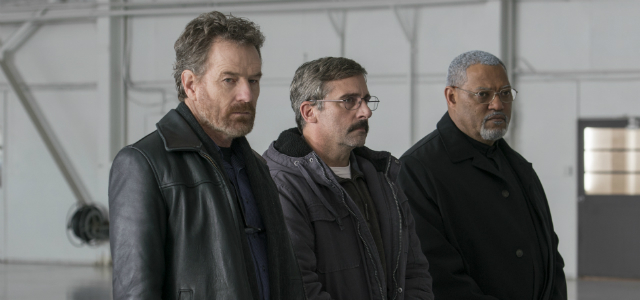Last Flag Flying
Thoughtful, heartfelt and well worth spending time with.
Plot summary
After his son dies in Iraq, Larry ‘Doc’ Shepherd (Steve Carrell) seeks out his old Vietnam buddies Sal (Bryan Cranston) and Richard (Laurence Fishburn). They agree to accompany him to retrieve and bury the body. Along the way, though, events drive them off course, forcing them to confront their own pasts as well as the institution they once served.

Leaving behind the trials and tribulations of youth to take a look at life on the other side of the hill, Richard Linklater cuts an older and more contemplative figure in his latest. Much like the wrinkles lining the faces of our trio of leads, the ravages of time echo throughout the film and lend an understated note of melancholy to every exchange, every scenario, even every relationship. The plot begins when Doc enters the bar of ‘Nam buddy Sal, but the story proper begins long before that. As we spend time with this erstwhile band of brothers we get to know more and more about their shared past – particularly the parts they’d rather forget – and we feel the full weight of that history. If Everybody Wants Some!! was a wistful look at a time when literally everything seemed possible to you, Last Flag Flying is very much about coming to terms with the choices you’ve made and reconciling yourself with them.
There’s a heaviness here that’s not been as present in his recent works, or at least not as close to the surface. But one of the joys of the movie – and it’s brimming with them – is in watching these moral reckonings explored with such unchecked life. True to form, Linklater has populated his flick with a triple-whammy of excellent performances, with Cranston, Fishburn and even Carrell easing into their characters and making their many flaws, contradictions and subtle grace notes really sing. As they progress along a journey that is ostensibly to find peace for Doc’s late son, they confront their demons in a way that feels unforced, cathartic, and ultimately real.
A sustained scene in the cargo hold of a commuter train, for instance, sees these old friends finding light in the darkness by breaking down laughing in the middle of a bout of reminiscing. It’s a remarkable feat of acting, being both utterly infectious and wonderfully familiar to anyone who’s ever felt the liberating release that comes from giving in to your emotions. It’s also damn funny, and one of many instances of Linklater and co taking a scene to places that you might not have expected but which, nonetheless, rings gloriously true.
Where the film stutters slightly is in its attitude towards the military. The more we uncover about what really went on back in ‘Nam to haunt these men so much, the more the US military is painted of a deeply flawed institution that is as dehumanising as it is inflexible. Indeed, narrative revelations and a bizarrely cartoonish antagonist only serve to compound a gently anti-authoritarian attitude. As we pull in for the landing, though, Linklater attempts a shift in tone. The focus moves from lightly critiquing the military’s propaganda machine to paying tribute to those that serve it. A sickly borderline-sentimentality creeps in and, though it’s by no means as egregious as Bill Pullman rallying the troops in Independence Day, it muddies the overall message somewhat. There’s a clear attempt at nuance somewhere in there, but its lack of elegance makes it feel like backtracking and sits at odds with what came before.
Last Flag Flying is about a nation’s complicated relationship with its armed forces, dramatised through a humbly affecting, deeply human exploration of grief and its generational ramifications. That it should end up tying itself in knots trying to make head or tail of its own feelings is only fitting and, in a way, part of its charm. It’s not top-tier Linklater, but it’s thoughtful, heartfelt and well worth spending time with.











COMMENTS